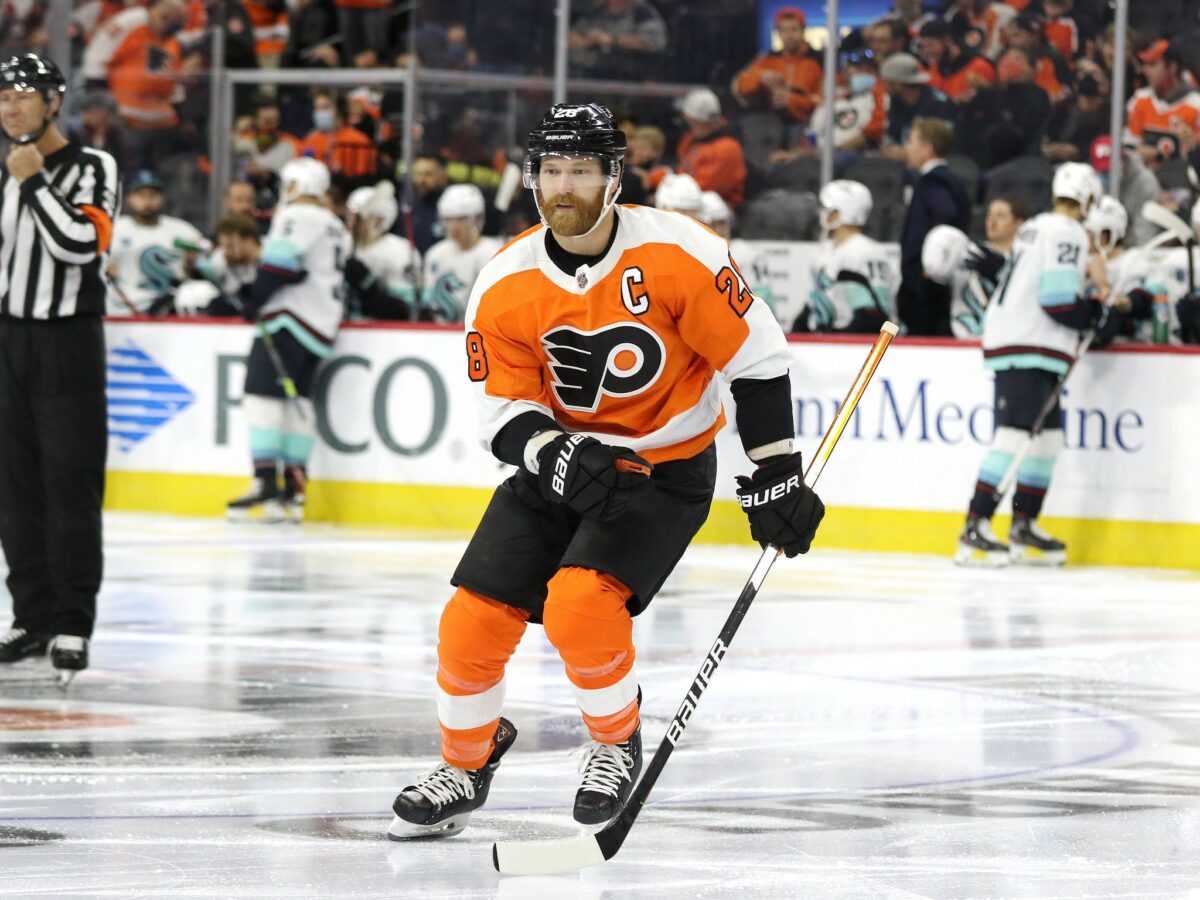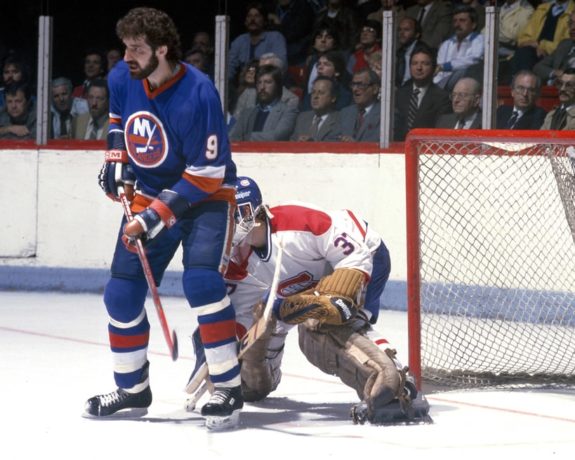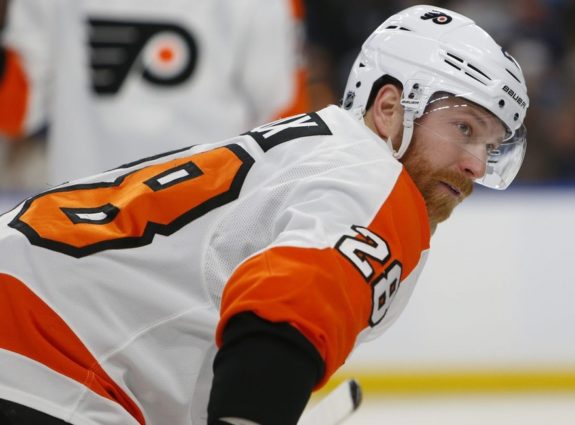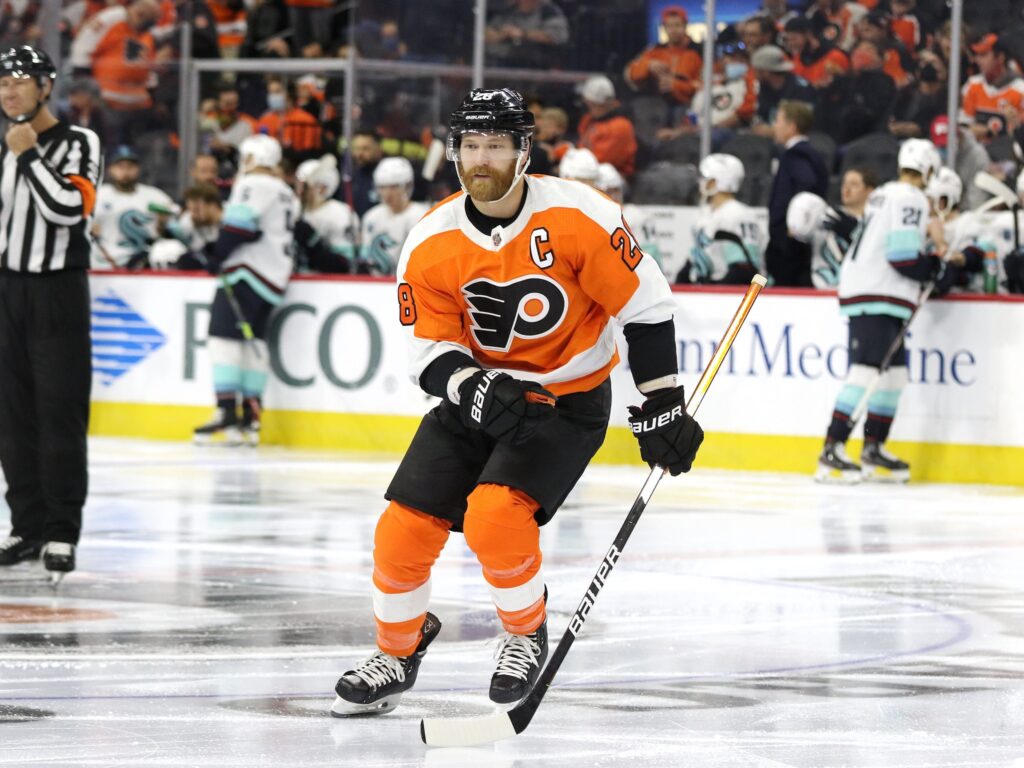*This archive was originally written by Colin Newby
Thirteen members of the Hockey Hall of Fame (HHoF) have played for the Philadelphia Flyers at some point during their careers. This list includes legends like Bobby Clarke, Bernie Parent, and Bill Barber. Does one more former Flyers legend belong on the list someday? There is a lot of disagreement regarding Claude Giroux’s Hall of Fame prospects.
Related: Flyers Failures Have Hindered Claude Giroux’s Career
Giroux played 1,000 games in parts of 15 seasons in Philadelphia. He sits second in franchise history in points, games played, and assists behind only Clarke in all three categories. Despite a less-than-spectacular supporting cast at certain points during his tenure with the Flyers, he scored 25 goals and added 48 assists in 85 playoff games in orange and black. He finished in the top five in the Hart Trophy voting three times and spent more games as their captain than any player in their storied history.

The 37-year-old isn’t quite ready to hang up the skates just because he’s left the Flyers. He produced at a prolific pace with 23 points in 18 regular-season games with the Florida Panthers after Philadelphia moved him in March 2022. His eight playoff points in 10 games were good enough for second place on a Panthers team that fell quietly in the second round against the eventual Eastern Conference champion Tampa Bay Lightning.
The former Quebec Maritimes Junior Hockey League (QMJHL) star signed with the Ottawa Senators in July 2022 to play close to the town where he’s spent the majority of his offseasons during his NHL career. Since joining them for the 2022-23 season, he has been one of their most productive players. On a team with blossoming young stars such as Tim Stützle and Brady Tkachuk, Giroux has provided a nice balance and added some veteran leadership.
What is a Hall of Fame Career?
Consider the following resumes of two former NHL forwards:
Player A: This player eclipsed 500 goals and 700 assists and finished his career with 1,216 points. He was a seven-time 30-goal scorer and tallied over 100 points three times. His best offensive seasons were in 1992-93 and 1993-94 when he finished 15th and tied for fifth in the NHL with 107 points, respectively. He was selected to nine NHL All-Star Games. Though he never won a Stanley Cup, he led his team to the Stanley Cup Final once as their top scorer. He scored 122 playoff points over the course of 154 playoff games, putting him among the elite in that department.
Player B: This player recorded 319 goals and 378 assists for 697 points in his 14-year career. Though he was a six-time 30-goal scorer, he was also known as one of the toughest players in the NHL in his day. He recorded over 1,000 career penalty minutes while protecting his future Hall of Fame linemates. He also helped lead his team to four consecutive Stanley Cup victories from 1980 to 1983; was selected to two All-Star Games, and captained his team for two seasons.

Both players are now in the HHoF, but one took much longer. Can you guess who is who? Player A is Jeremy Roenick, and Player B is Clark Gillies. Roenick had the better offensive numbers, but Gillies was the shoo-in hall-of-famer. Roenick is evidence that offensive production alone usually does not guarantee a spot in the Hall of Fame, so there must be other factors that determine a player’s eligibility.
Evaluating the Criteria for a HHoF Bid
The trouble with hockey is that it doesn’t have a statistical threshold that equates to an HHoF bid. In baseball, unless you violate MLB rules, recording 300 wins or obtaining 3,000 hits will get you a one-way ticket to Cooperstown. Hockey doesn’t have a direct parallel. One might think that 500 goals or 700 assists would do the trick, but Roenick retired around the same time Giroux entered the league and has still not been inducted.
Related: THW’s Hall of Fame Worthy Collection
The Roenick and Gillies examples show that sometimes, team contribution is just as important as individual achievement. Of course, if a player scores at a Wayne Gretzky or Jaromir Jagr rate, they will make the HHoF regardless of team contribution (for good measure, both also won multiple Stanley Cups). Nonetheless, players like Gretzky and Jagr only come about once or twice a generation. Therefore, most other players will need to make significant contributions to their team’s success.
Roenick helped get his team to the playoffs almost every season, doing so 17 times, but he never won a Cup in his career. Since he was a top player, his lack of Stanley Cup success mainly rides through him, rather than his teammates. Even though he should not be blamed entirely, not ever winning a championship hurts his status as a potential HHoF player.
On the other hand, Gillies served a vital role during his 12 years with the New York Islanders. Though he scored 30 goals multiple times, he knew that he was not expected to be the primary scorer. Rather, he played as a hard-checking power forward and enforcer. He would do the dirty work so that his future HHoF linemates, Mike Bossy and Bryan Trottier, could score. Gillies made his teammates better by doing the dirty work, and he was an essential factor in New York’s four consecutive Stanley Cups from 1980-1983. He was deserving of his HHoF nomination.
You may also like:
The ideal HHoF candidate will have strong individual achievement and contribute to his team’s success. For a forward, points, All-Star Game appearances, and individual awards are all important. Leadership, team success, and legacy should also play a role in the evaluation process.
What Does Giroux Still Need to Do?
The good news for Giroux is that he’s already compiled impressive individual achievements in his career. He has already recorded more assists than several Hall of Famers, including Mike Bossy, Pat LaFontaine, and Eric Lindros. In the 2010s, only Patrick Kane, Sidney Crosby, and Alexander Ovechkin had more points than the former Flyer.

Although his days in the Hart Trophy conversation are behind him, Giroux played at a high level on a desolate Flyers roster limping through injuries and underperformance in 2021-22. His stint with the Panthers showed the production that could come with a stronger supporting cast, and his time with the Senators has further proven that narrative.
Giroux’s longevity and durability will play in his favor when the voters look back at his career after he finally decides to hang up the skates. If he can continue to compile stats with the same incredible consistency as he has shown throughout his lengthy NHL career, he will give himself a good shot at the HHoF. We’ll just have to watch how the last chapter of his already illustrious career plays out.



